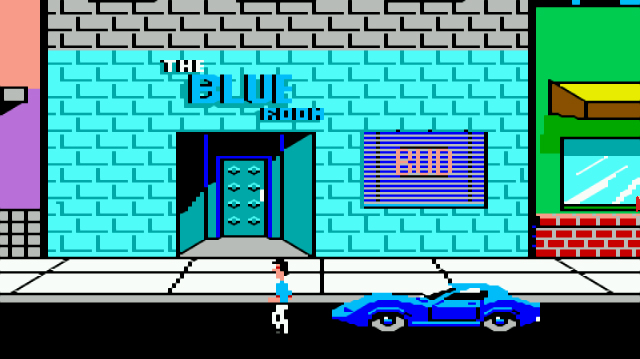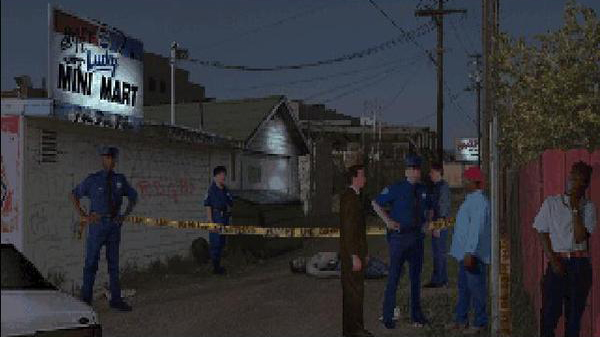
Here I'd like to present two articles that deal with the representation of the LA riots in video games, past and (near) present. First, is the notorious Police Quest 4: an old-school early 1990s adventure game by Sierra Online: Police Quest 4: Open Season, one of the most sexist. racist, and transphobic video games ever made, and which had the dubious distinction of being co-authored by disgraced former LA police chief Daryl Gates, who had just been ousted following the beating of Rodney King and the ensuing riots.
From Vice: How Sierra and a Disgraced Cop Made the Most Reactionary Game of the 90s by Duncan Fyfe Jan 18 2018,
The now defunct Sierra-Online made early primitive PC games of the "adventure" genre during the 1980s and early 90s: the types of games with primitive graphics that would have you interact with the world by typing in keyboard commands such as "pick up key", "open door", and "move north". Their flagship series was the medieval "kings quest" and spinoffs such as "space quest" and eventually the gritty "police quest" series, which would have you the player be a police officer tasked with solving crimes.
 /
/The original Police Quest- 1987
For the fourth iteration of the series, Sierra made the ill-advised decision to court controversy by hiring the disgraced Los Angeles police chief Daryl Gates, who had presided over the Rodney King beating and subsequent riots. Conservative CEO of Sierra Ken Williams, ignoring the repeated pleas of his company's creative team to find a different law enforcement consultant, hired on Gates, who saw the game as an opportunity to "“maybe say something important about law enforcement… [and to] try and give people a better appreciation for what officers face on the job and encourage a willingness to support them.” The two, Williams and Gates, brought a very reactionary worldview to the game, as they both saw Los Angeles as a city under siege by hoodlums and saw Gates as a martyr who had taken the fall. They were both noted conservatives and fans of the Rush Limbaugh talk show. However, the other members of the company were very upset with this decision, Ken William's then business partner Josh Mandel notes: “There were a lot of people at the company that were horribly, horribly unhappy… that Ken and management would capitalize on someone as controversial and dark as Daryl Gates. And Police Quest 4 got [a] different name inside the company. We started calling it Rodney King’s Quest.”

Above is the opening scene of Police Quest: Open Season, which came out in Novemeber 1993 "with Gates’ name in big letters on the box. The player " finds a slain cop and a black child in a dumpster." which ends with you torturing and killing the transgender serial killer"with an improvised blowtorch. He gets a medal for it." The article describes Gates' vision of LA as " a fallen cathedral, where the good and moral and quiet wait in fear of multicultural street scum, creeping over some liminal threshold into white suburban reality. " The game is filled with racist and homophobic undertones: "Gay men and sex workers are lascivious. Black characters say things like “Yo, I be fly today!” and “This be my ‘hood. I be Raymond Jones da third.” with the white police officer protaganist as the "thin blue line" protecting white america from the streets. Overall the Vice critic concludes "It may be a failure of characterization and narrative, but it is a perfect encapsulation of Daryl Gates’ worldview."
Now, this was a game released in the very early days of computer and video games, it was also a complete commercial and critical failure. However, for the 'present" portion of this blog, I'd like to draw attention now to the incredibly popular and ongoing Grand Theft Auto series by Rockstar Games, and this article: Grand Theft Auto and the airbrushing of history

While the Sierra style of text-adventure games is a relic of the past, Grand Theft Auto is a modern, 3D open world game. Rather than typing commands the player has full control over the main character: you can run, jump, shoot, steal and drive cars. Moreover, the game world of Grand Theft Auto is incredibly sophisticated- as you walk around the streets are populated with pedestrians, gang members, prositutes, and the ever present police force, which, if you choose to commit crimes, will hunt the player down with increasing force- small crimes like carjacking will earn you one star, and cause police on foot to subdue you with clubs, while major crimes like mowing down dozens of people in your car and blowing up cop cars will earn you up to five stars- causing SWAT teams, police helicopters, and even the military in tanks to attack the player.

Above is a screen shot of GTA: San Andreas, released in 2004- however the game is set in the 1990s in a fictionalized version of the Los Angeles area (dubbed "Los Santos". The climax of the game involves a riot, just like the Rodney King riots, stemming from the aquittal of a corrupt police officer. However, unlike the Rodney Verdict, this officer is black (voiced by Sammuel L Jackson no less), and unlike the officers who beat Rodney King, he is on trial for dealing drugs and corruption, rather than assaulting a citizen. The author of the above article goes on to take the game to task for "(excluding from its version of the LA riots any examination of historical racial tension."

Essentially, while not as overtly racist and reactionary as "Police Quest", the GTA games offer a worldview that is essentially right-liberatarian, anti authority but also staunchly pro-capitalist: think the show "South Park" for example, the game makes fun of liberals and conservatives in equal measure, and is rife with racial stereotypes. During the "riot" portion of the game, the formerly peaceful pedestrians will now attack you, and the police will direct their attentions on them instead of you, creating a sense of chaos. However, unlike the real racial problems of everyday LA, these riots simply end the moment you kill the corrupt black officer Tennpenny. The author of the above article cites how ignorant the game is of very real social problems in LA that lead to the real riots:" Within just 50 in-game days, CJ amasses a business empire comprising a casino, a record label and a car dealership – in less than two months, he goes from living in federal housing in one of Los Santos’ ghettos to being a multimillionaire. " The message of the game is anti-cop in so far as it is anti-authority, but it is hyper individualistic, masculine, and capitalist. This is similar to the blindness of the previous entry in the series, Vice City, which gleefully ripped off the Al Pachino version of Scarface but without the main character suffering any consequences in the end.

GTA series is alive and well, above: GTA 5, released 2015 on XBOX
Overall, these two games show a trajectory of changing attitudes and worldviews in the medium of video games concerning the LA riots and their social, racial, and political consequences. In the first instance we have a tremendously racist and reactionary early 90s title that was actually co-authored by the top officer of the LAPD at the time of the riots. A decade later we have a much more sophisticated video game that no longer makes the police into heroes but instead champions violent, capitalistic black anti-heroes, yet completely whitewashes the racial component of the LA riots and is still staunchly libertarian and pro-capitalist in its ideology. Overall, video games have maybe moved an inch since the years following the LA uprising, and they still have much further to go. Recent titles such as the independently produced "Undertale" and "Night in the Woods" were profoundly leftist and anti-capitalist, yet were mostly devoid of any possible racial commentary, being populated with anthropomorphic animal characters. Overall video games and their most vocal fans have in the past been largely reactionary and resistant to change, but that may be beginning to change now in the present.

Night in the Woods is really good go play it !
Kiyo Ouchida-Sharif
Wow, this is a really good posting. All of the images are from GTA, but all of the scenarios in this game are based off daily American life. It is most likely unintentional, but this game really captures discrimination and highlights those that fit the image of societal targets.
ReplyDelete